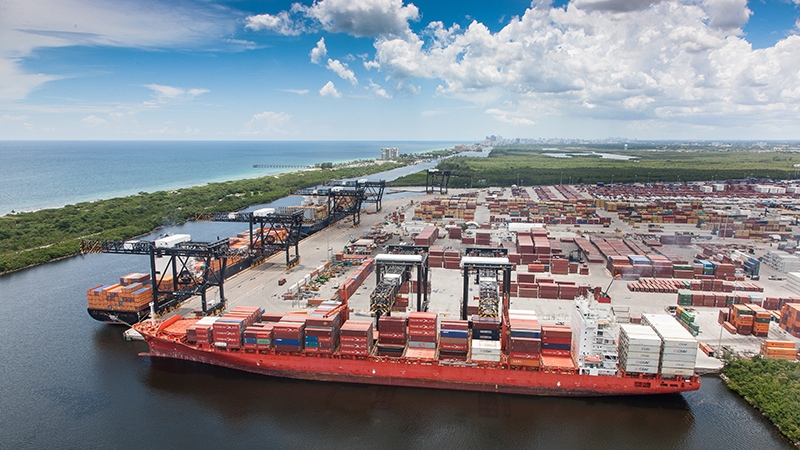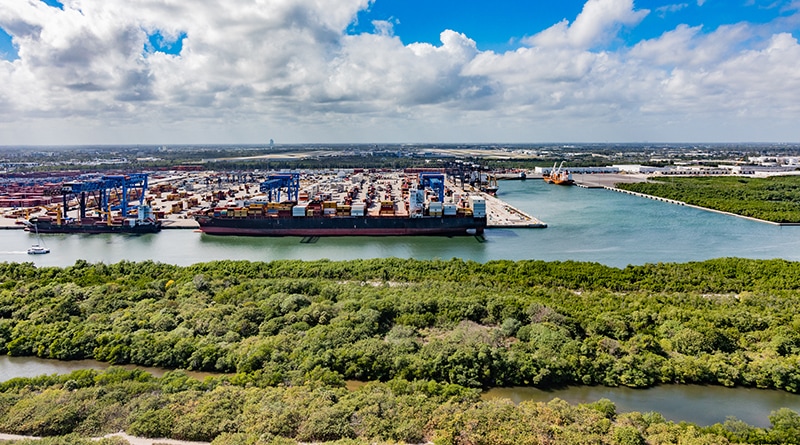Florida: Channeling Global Success
Long a premier logistics location, Florida has set its sights on growing its already enviable place in the global economy. The state’s logistics assets, including deep-water seaports like Port Everglades, lead the way.
If we accounted for all the numeric evidence that Florida is a hot spot for logistics and distribution, we would be clicking off numbers faster than an Orlando theme park turnstile.
Here are just a few key figures:
0
That’s what Floridians pay in personal income taxes. Yes, zero. Florida does not depend on income taxes for its state government revenue. Likewise, the Sunshine State has a long history of keeping regulatory requirements and business taxes low, which is good news not only for logistics operations, manufacturers, and the businesses they serve, but also for the individual residents they employ.
1
Partly due to the above—but only partly, because there are so many more reasons to cite—Florida is the number 1 state in the nation for attracting and developing skilled workers. And there’s no need to take state cheerleaders’ word for it (though the cheerleaders are legion). The declaration of Florida’s premier skilled workforce is made by Lightcast, a global leader in labor market analytics.
15
If Florida were a country, its $1.3-trillion market would rank it as the 15th largest economy in the world. If you’re looking for a yardstick, consider this: That’s more than three times the market of the United Arab Emirates ($415 billion).
Bright Future
Logistics-specific numbers add flourishing touches to this bright picture: More than $190 billion worth of goods flow through Florida’s ports and airports, fueled by the state’s strategic location and extensive trade support services.
Florida businesses export nearly $68 billion to more than 180 countries. Not surprisingly, the state offers the second-largest Foreign Trade Zone network in the United States.
Given those numbers, it is abundantly clear that whether you are serving Florida’s own huge market or your focus is on the rest of the United States, Latin America, or the globe, few locales can expand your reach like Florida.
As the Western Hemisphere’s commercial gateway, Florida is a top choice for any company in search of global access. And as every logistics professional knows, global access is a prime requirement for success.
Powered for Logistics
Home to almost 20% of all U.S. exporters, Florida is an ideal site for logistics, supply chain, and distribution companies. Nearly every major global logistics integrator has a presence in Florida.
The broader wholesale trade, transportation, and logistics sector in Florida accounts for more than 71,600 companies and employs more than one-half million individuals across the state.
The state’s leadership in logistics is due to more than its strategic location. It is powered by the extraordinary level of cooperation that exists between industry leaders and government.
Propelled by Partnership
With the creation of Enterprise Florida, Inc. in 1996, Florida became the first state in the nation to place principal responsibility for economic development, international trade, research, and marketing in the hands of a business-government partnership.
Enterprise Florida capitalizes on logistics as a major catalyst for economic growth and serves as the state’s primary entity for trade and export development.
The organization also supports more than 60,000 Florida exporting businesses. In addition, Enterprise Florida assists small and minority businesses through its capital programs, and it supports specific industries through targeted programs and efforts tailored to vital sectors of the economy.
The combination of all these efforts stands as a sturdy framework for companies to make the most of the geographic and economic assets that distinguish Florida as a logistics hot spot.

Port Everglades is a leading container port in Florida and among the most active cargo ports in the United States. The total value of economic activity at Port Everglades is nearly $30 billion.
Port Leadership
Port Everglades is a leader among Florida’s vast network of logistics resources, including 15 deep-water seaports.
Perfectly positioned in the heart of South Florida’s rapidly growing consumer center, with direct access to Latin America and the Caribbean, Port Everglades is helping companies accomplish their supply chain goals.
Port customers benefit from direct highway access, an international airport within two miles, and state-of-the-art Foreign Trade Zone warehousing.
In addition, a 43-acre international and domestic intermodal container transfer facility makes it possible for cargo shipped to Port Everglades to reach Atlanta and Charlotte within two days and 70% of the U.S. population in four days.
“Business diversity and a strong commitment to customer service distinguish Port Everglades from most U.S. seaports,” says Port Everglades CEO and Port Director Jonathan Daniels.
“This year, we unleashed a new logo and brand that better define our port’s enviable position in the marketplace,” he says. “The mythological trident points the way to our core values of strength, sustainability, and resiliency while the three prongs simultaneously illustrate our three business lines—cruise, cargo, and energy.”
Global Gateway
An epicenter for international trade, Port Everglades is strategically located in one of the world’s largest consumer regions, including a combined 110 million residents and seasonal visitors within an 80-mile radius.
In fact, Port Everglades is the leading U.S. gateway for trade with Latin America, moving 13% of all U.S./Latin American trade.
The port’s diversified cargo mix includes containers, refrigerated cargo (fourth for imports in the United States), new and used automobiles and trucks, dry bulk, breakbulk, project, roll on/roll off, and liquid bulk.
Business opportunities in and around Port Everglades are expanding with the construction of two warehouses that will offer distribution and logistics services.
Seagis Property Group is completing a 199,624-square-foot speculative development just outside Port Everglades’ security entrance, allowing for prompt entry to the seaport’s cargo terminals, Port Everglades International Logistics Center (PEILC), and Florida East Coast Railway’s near-dock facility. Bridge Industrial is building another warehouse within one mile of the port’s entrance. It anticipates completing its 171,983-square-foot speculative logistics facility in the first half of 2024.
The CenterPoint Port Everglades International Logistics Center (ILC), a public-private partnership with the port, has efficient, contemporary warehousing within two buildings on 16.657 acres of port property.
The ILC contains warehouse, refrigerated warehouse and office space, and cross-docking facilities to support services available to Port Everglades shippers. The entire logistics center is designated as a Foreign Trade Zone. The port continues to be a magnet for new businesses.
Always striving to modernize its facilities to maximize productivity, Port Everglades follows an aggressive, comprehensive master/vision plan that is updated every two to four years to reanalyze market trends, changes in the cruise, cargo shipping and energy industries, local planning initiatives, and evolving technology.
This in-depth analysis provides a projective and substantiated market-driven and environmentally sound phased roadmap for guiding cost-feasible capital investments.
Strategic Expansion
While it would be understandable if Florida’s government and industry leaders were to pursue a strategy of doing more of the same things they’ve always done to put the state at the top, the reality is far from that.
The state is “purposely expanding manufacturing, logistics, and rural economic growth” in a quest to grow the state to the 10th largest global economy by 2030, says Mark Wilson, president of the Florida Chamber of Commerce and Foundation.
Following the strategic direction of the “Florida 2030 Blueprint’s Six Pillars Framework,” the chamber has conducted follow-up research that aims to secure Florida’s infrastructure for growth and development. Called the “Florida Trade & Logistics 2030 Study,” the report highlights the importance of trade, logistics, export-oriented manufacturing, and rural economic development.

Port Everglades is South Florida’s main seaport for receiving petroleum products. The port’s cargo mix includes containers, refrigerated cargo, new and used automobiles and trucks, dry and liquid bulk, breakbulk, project, and roll on/roll off.
Seizing Opportunity
The Florida Chamber Foundation encourages the state’s businesses, economic-development groups, local chambers of commerce, and lawmakers to leverage the study to inform policy and economic strategies over the next decade to ensure Florida remains globally competitive and continues to move the needle on its economic growth.
The focus on manufacturing, logistics, and trade is “a rallying cry, not of an industry but for the future of Florida,” says Wilson. He wants Floridians to think globally about the state’s economic future. “We have a generational opportunity to get this right,” he says.
The 2030 study features a series of strategies and recommendations to seize Florida’s opportunity to grow its place in the global economy—all of which send an encouraging message to logistics professionals.
Among key priorities:
- Reaffirm the statewide priority for trade, logistics, and manufacturing.
- Establish a statewide, focused manufacturing initiative.
- Close essential workforce gaps and strengthen the talent pipeline.
- Continue to strengthen trade gateways and corridors.
- Establish a comprehensive site development program with emphasis on rural areas.
- Continue redesigning Florida’s economic development toolkit.
- Leverage rural economic development to double the percentage of GDP from rural Florida.
“The trade and logistics industry is quickly evolving, and the strength and well-being of Florida’s manufacturing economy is inextricably connected to its success,” says Kevin Carr, CEO of FloridaMakes, a statewide, industry-led public-private partnership with the sole mission of strengthening and advancing Florida’s economy by improving the productivity and technological performance of its manufacturing sector.
From the depths of its deep-water ports like Port Everglades to the heights accessed by its 20 commercial airports and three spaceports, Florida is a logistics hot spot that just keeps getting hotter.

